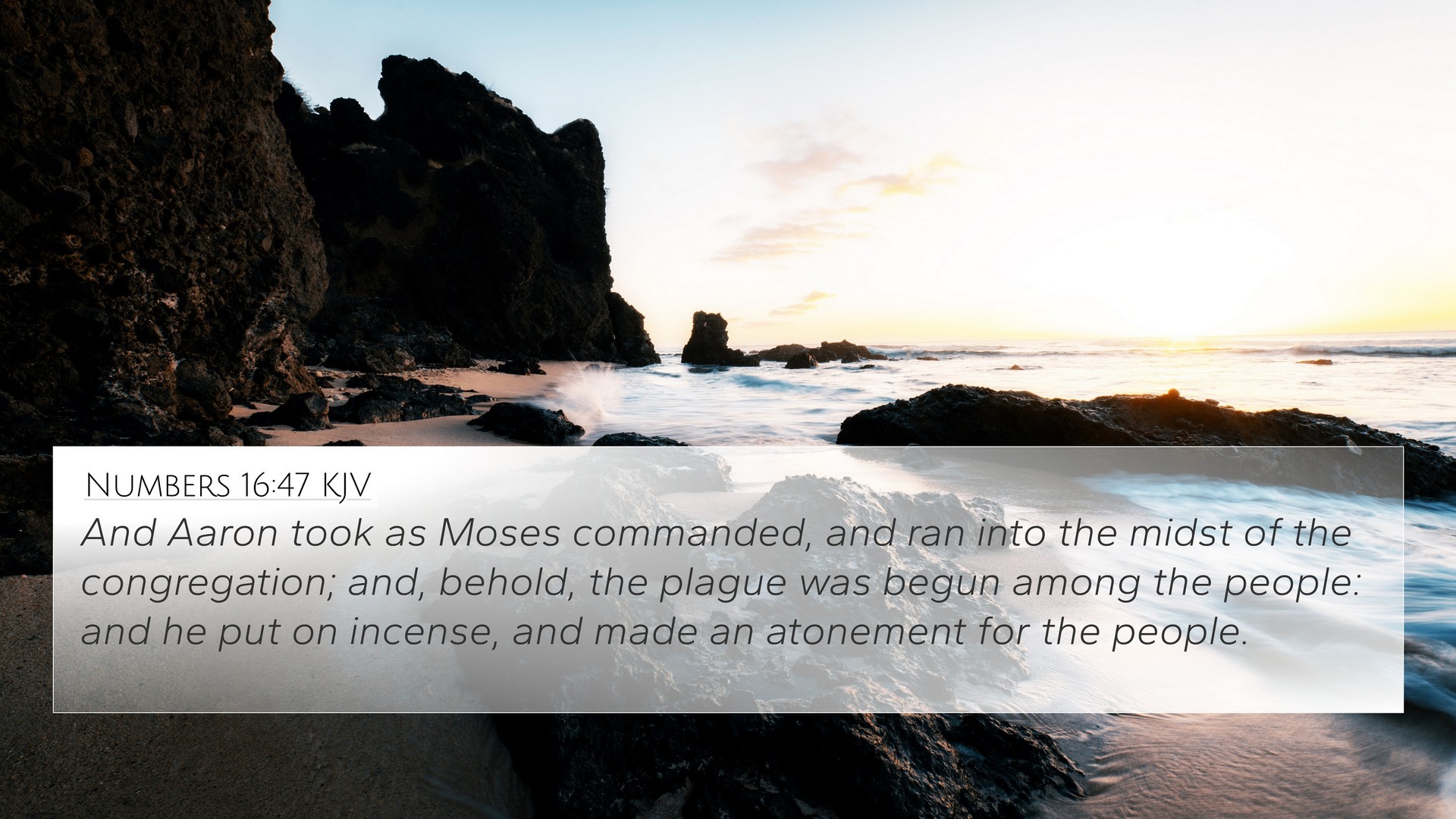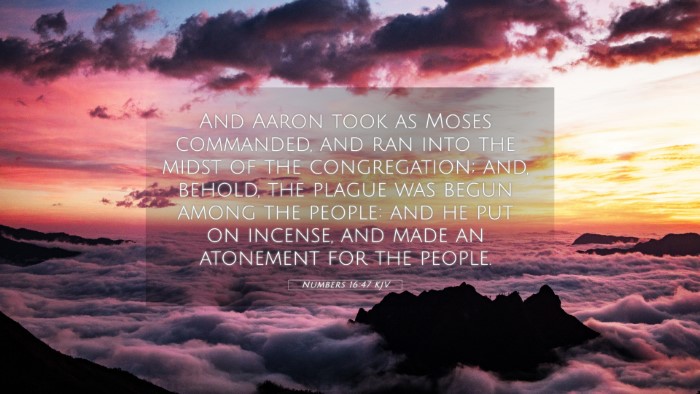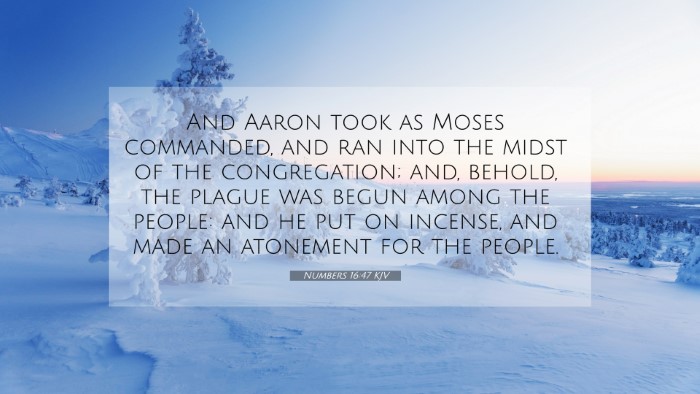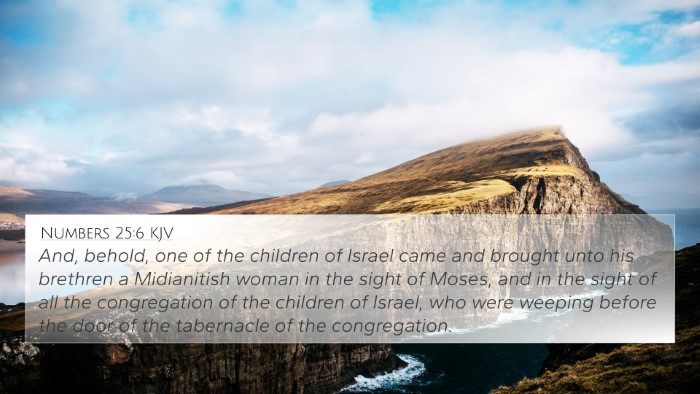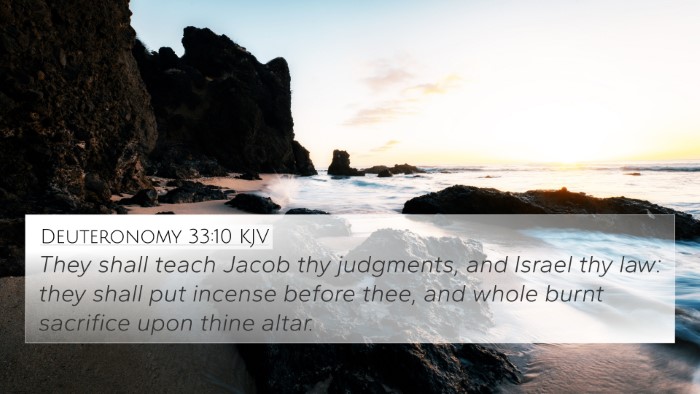Understanding Numbers 16:47
The verse Numbers 16:47 states:
"And Aaron took as Moses commanded, and ran into the midst of the congregation; and, behold, the plague was stayed." (KJV)
Summary of the Verse's Meaning
This verse occurs amidst a significant narrative where God's judgment was falling upon the people of Israel due to their rebellion against Moses and Aaron. Aaron’s response is one of urgency and obedience, as he seeks to intercede for the people and halt the divine plague.
Commentary Insights
Here, we combine insights from renowned public domain commentaries:
- Matthew Henry: Henry emphasizes the role of Aaron as both a priest and leader. He points out that Aaron's swift action to offer incense signifies the importance of intercession. This act not only demonstrates faith but also reflects the significance of seeking divine mercy in times of judgment.
- Albert Barnes: Barnes notes that the plague symbolizes God’s divine judgment. He explains that the incense's properties represent the prayers of the faithful, which are a means to avert disaster. This highlights the theme that intercession can lead to divine mercy and healing.
- Adam Clarke: Clarke discusses the symbolic nature of Aaron’s actions. He interprets the running into the midst of the people as a gesture of compassion and leadership. Clarke illustrates that this instance reflects the broader biblical theme of substitutionary atonement, where a mediator stands between God and the people to halt judgment.
Bible Cross-References
Numbers 16:47 can be cross-referenced with several other Bible verses that establish thematic and narrative connections:
- Exodus 30:7-8: Discusses the role of incense and Aaron's duties in offering it before the Lord.
- 1 Chronicles 21:16: Illustrates the concept of a priest as a mediator in the face of God’s wrath.
- Hebrews 7:25: Talks about Jesus as the ultimate intercessor, paralleling Aaron's role.
- James 5:16: Encourages prayer for one another, echoing the intercessory spirit found in Numbers 16:47.
- Psalm 141:2: Presents the prayers as incense before God, linking to the theme of Aaron's offerings.
- Romans 8:34: Discusses Christ's intercession, similar to Aaron's in times of crisis.
- Galatians 3:19: Reflects on the law and the role of mediators, touching on Aaron’s duties.
- Exodus 32:30-32: Depicts another moment where Moses intercedes for the people, much like Aaron does here.
- Ezekiel 22:30: Discusses the need for intercessors among the people of Israel.
- 2 Samuel 24:17: Displays a plea for mercy similar to the context found in Numbers 16:47.
Thematic Connections
The central theme of Numbers 16:47 revolves around intercession and divine mercy. It illustrates the critical role that mediators play in alleviating God’s judgment:
- Intercession: Aaron’s act of running into the midst symbolizes the urgent need for a mediator in times of crisis.
- Divine Judgment: The plague serves as a stark reminder of God's holiness and the seriousness of rebellion against Him.
- Mercy: The stopping of the plague showcases God's willingness to relent when approached with sincere intercession.
Using Bible Cross-References
Engaging with cross-references enriches understanding of scripture. Here are some practical tools for Bible cross-referencing:
- Bible Concordance: Utilizes word indices to find related scripture verses.
- Bible Cross-Reference Guide: Offers organized resources for discovering thematic connections.
- Cross-Reference Bible Study: Techniques to utilize cross-referencing in personal Bible study.
- Comprehensive Bible Cross-Reference Materials: Books and resources that compile extensive biblical parallels.
Conclusion
Numbers 16:47 exemplifies the profound significance of intercession in the biblical narrative. The insights from esteemed commentaries and the cross-references presented provide a deeper understanding of the connections within the Scriptures. As one studies this verse and its connections, the themes of leadership, prayer, and divine mercy emerge strongly, encouraging believers to grasp the importance of their own intercessory roles in prayer.
